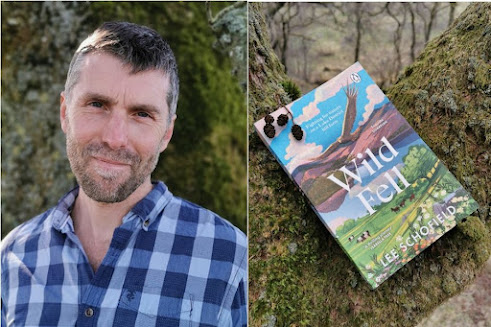Wild Fell Wins Top Literary Prize for Nature Writing
Lee's Zoom talk about his book and his work at RSPB Haweswater can be viewed here.
· On this International Day of Biodiversity [22 May 2023], the popular book Wild Fell: Fighting for nature on a Lake District hill farm has been announced as the winner of the prestigious Richard Jefferies Award.
· Author Lee Schofield is RSPB Senior Site Manager at Haweswater, a partnership between nature conservation charity the RSPB and the landowner United Utilities, where 30 square kilometres of spectacular upland, Lake District landscape is managed in a way that integrates ecological restoration with sustainable farming.
Lee Schofield was announced today (The International Day for Biodiversity) as the winner of the Richard Jefferies Award for the best nature writing published in 2022 for his book titled Wild Fell: Fighting for nature on a Lake District hill farm published by Doubleday.
Wild Fell is a vivid and detailed
account of Lee Schofield’s work as the RSPB’s Site Manager at Haweswater in the Lake District, where the nature conservation charity works in
partnership with the landowner United Utilities. Their aim is to discover ‘how
to rebalance farming and nature’ and ‘to develop a way to look after our land
that occupies the middle ground between hill farming and conservation,
restoring nature, respecting traditions, producing food, and supporting the
local economy’. This might sound like an almost impossible agenda, and
Schofield does not duck the challenges he has faced in mediating between the
interests of a variety of key stakeholders in a highly sensitive landscape.
Although Wild Fell engages fully with the political, social, economic,
cultural and financial contexts that affect Haweswater, it is above all an
optimistic and uplifting record of projects that are advancing conservation,
producing positive changes and enriching the biodiversity of the environment.
These initiatives include altering land usage, especially by scaling back the
number of sheep, extensive new planting of trees and wildflowers, restoring a
river to its natural course, soil improvement, and developing eco-tourism to
benefit the local economy. Success depends on having plans that interact and
reinforce each other, and which accommodate both compromises and co-operation
with the local community, and the book is a convincing illustration of what can
be achieved when a conservation organisation works with a water company and the
local community to effect change.
Professor Barry Sloan, Chair of the panel of judges, said:
“Much of the appeal of Wild Fell stems from the fluency with which Lee Schofield conveys the intimate knowledge and deep feeling he has developed for the Haweswater landscape, his own personal commitment to enriching and developing it, and the unabashed delight he takes from each sign of progressive change. It is a highly personal story as well as a thoroughly documented account of a complex and ongoing conservation project, a combination which should earn it the wide readership it deserves.”
Lee Schofield said:
“As a first-time author, and as someone who never imagined I’d have a book published, winning the Richard Jefferies Award is genuinely beyond my wildest dreams. There really would be no story to tell at Haweswater if it weren’t for my wonderful RSPB colleagues past and present, and the inspiration and energy I’ve gained from the Lake District’s growing band of conservationists and nature-friendly farmers. This award is really for all of them.”
The judges are drawn from the Richard Jefferies Society and their sponsors, the White Horse Bookshop, Marlborough who had the difficult choice of selecting an overall winner from a highly commendable shortlist of books:
Where the Wild Flowers Grow – Leif Bersweden (Hodder & Stoughton)
Wild Fell – Lee Schofield (Doubleday)
The Treeline – Ben Rawlence (Jonathan Cape)
The Lost Rainforests of Britain – Guy Shrubsole (William Collins)
Fen, Bog, and Swamp – Annie Proulx (Fourth Estate)
Illuminated by Water – Malachy Tallack (Doubleday)
Congratulations are due to all the authors on the short list who got this far in an increasingly strong competition.


